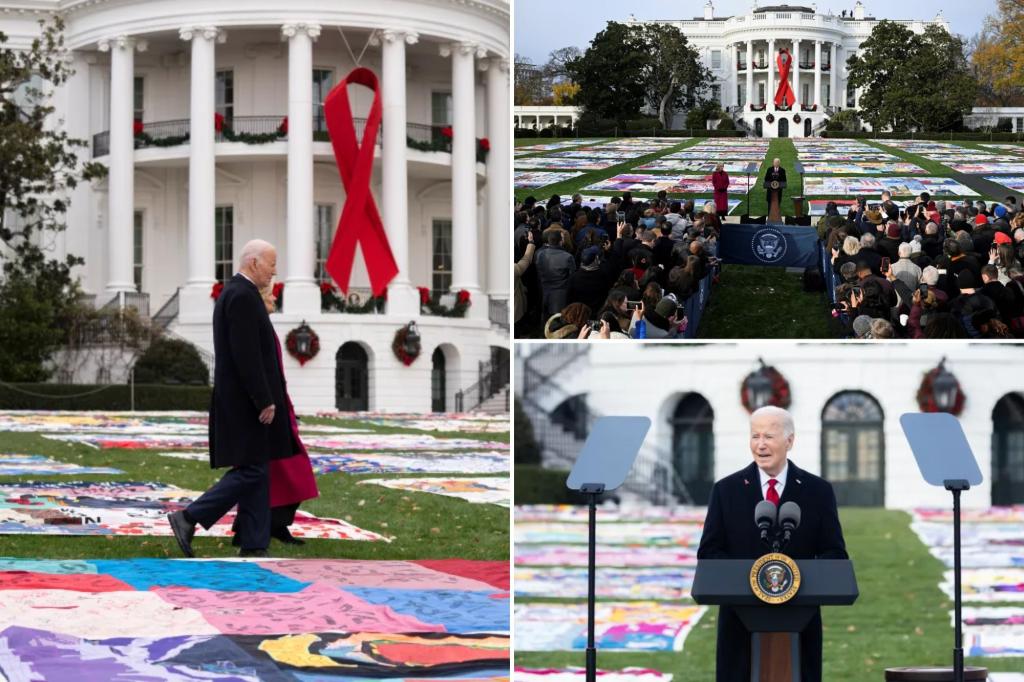On World AIDS Day, President Joe Biden made history by unveiling the AIDS Memorial Quilt on the White House South Lawn for the first time, a deeply symbolic event that honored the lives lost to the AIDS epidemic. Accompanied by his wife, Jill Biden, and a gathering of survivors, family members, and advocates, the president highlighted the federal government’s commitment to supporting the estimated 1.2 million individuals living with HIV in the United States. In his remarks, Biden underscored the significance of the movement against HIV/AIDS, stating that it is an integral part of America’s history. He acknowledged the efforts made by countless individuals in changing perceptions and saving lives, creating a sense of hope and collective action in the fight against the disease.
The quilt is a poignant tribute consisting of 124 sections displayed on the South Lawn, each representing lives lost to AIDS-related illnesses. Originating in 1985, the quilt first gained public attention in 1987 and has since become a powerful symbol of remembrance and awareness in the ongoing struggle against HIV/AIDS. During the event, a red ribbon, signifying support and awareness for those living with HIV, was draped across the South Portico of the White House, further emphasizing the administration’s commitment to addressing the epidemic on a national level.
The event featured Jeanne White-Ginder as a key speaker, who shared her son’s tragic story of contracting AIDS through a contaminated blood transfusion at the young age of 13, leading to his death at 18. Her advocacy played a crucial role in raising awareness about the need to fight the epidemic without stigmatizing those affected. White-Ginder reflected on her interactions with Biden back in the early 1990s when she advocated for the Ryan White CARE Act, a landmark legislation that provides funding for medical care and support services for individuals living with HIV/AIDS.
The ceremony also honored Dr. Anthony Fauci, a prominent figure in public health and one of the leading experts on infectious diseases in the U.S., who was recognized for his longstanding work on AIDS before gaining prominence for his leadership during the COVID-19 pandemic. Fauci’s presence at the event serves to remind the public of the ongoing relevance of HIV/AIDS advocacy and the importance of addressing public health challenges through science and compassion. His legacy, intertwined with significant policy advancements, illustrates a continued commitment to combating health crises underpinned by a dedication to evidence-based practices.
Moreover, the Biden administration’s current efforts aim to reinvigorate the national response to the HIV/AIDS epidemic, seeking to reduce not only the infection rates but also the stigma surrounding the disease. Among these initiatives is the extensive promotion of PrEP (pre-exposure prophylaxis), a preventive treatment for individuals at higher risk of contracting HIV. By making this treatment more accessible and raising public awareness, the administration hopes to empower communities and ultimately eradicate new HIV infections.
In conclusion, the White House event marking World AIDS Day and the display of the AIDS Memorial Quilt illustrates the administration’s commitment to remembering lives lost while also actively promoting strategies to combat HIV/AIDS today. Through collective action and continued advocacy, the administration emphasizes a future where medical advancements and societal acceptance work hand in hand, fostering a more equitable health landscape for those affected by HIV. By championing this crucial issue, the Biden administration acknowledges the lessons learned from the past while striving for a more inclusive and healthier future for all.

